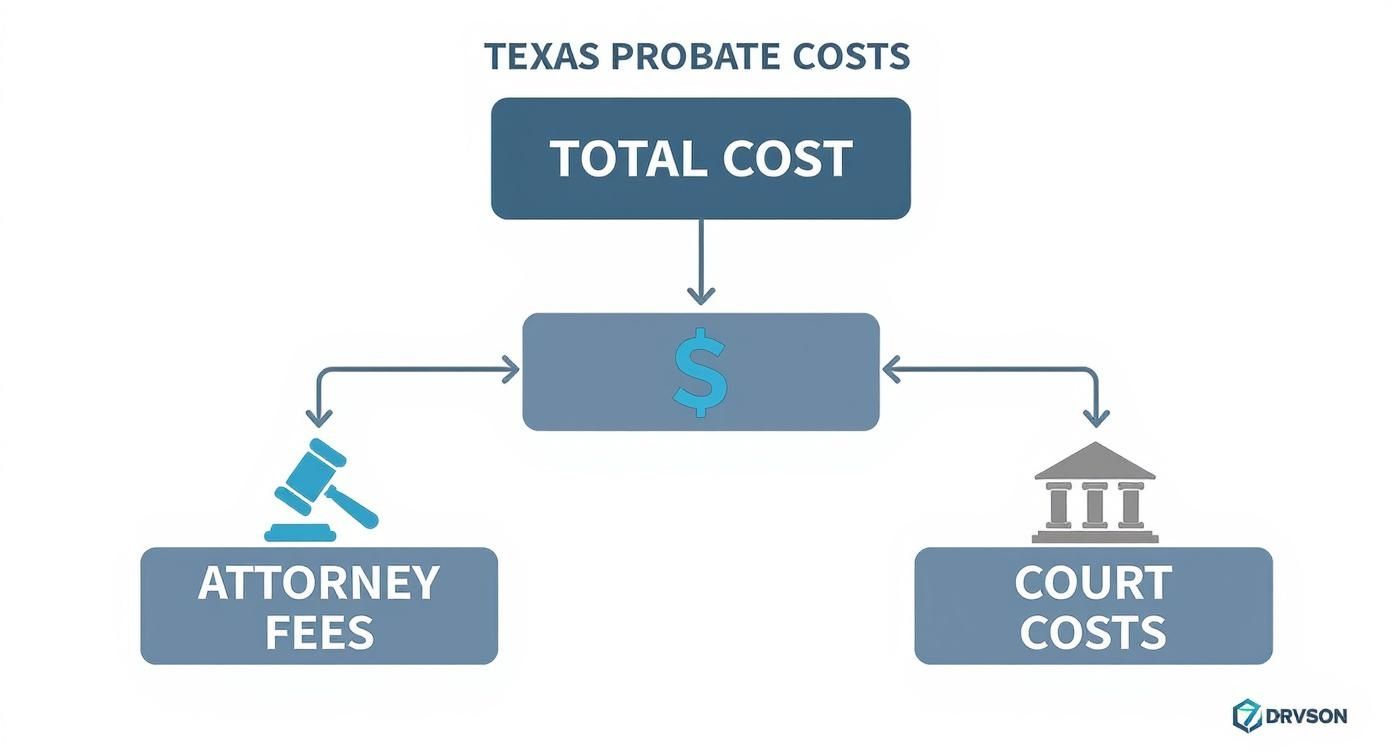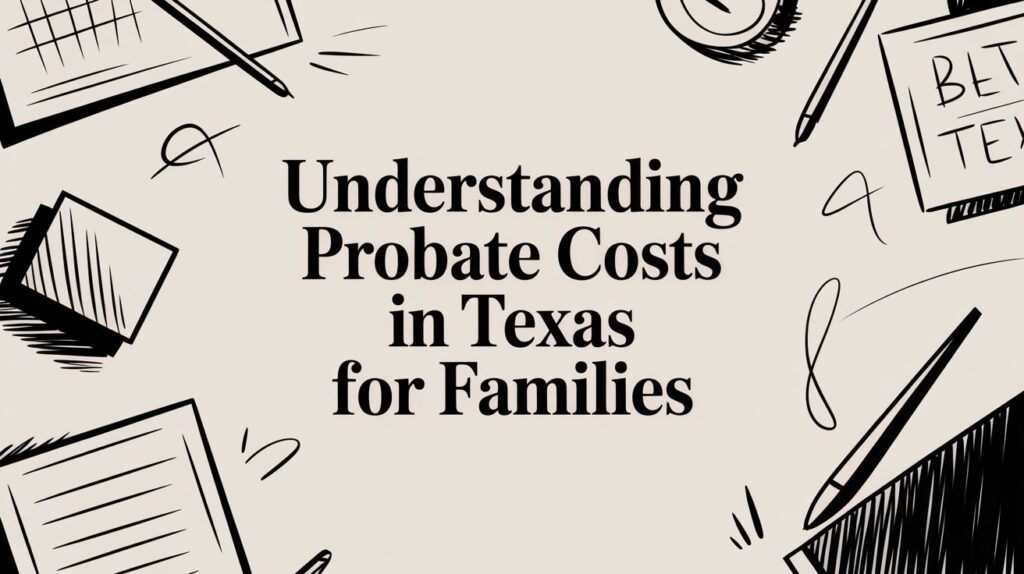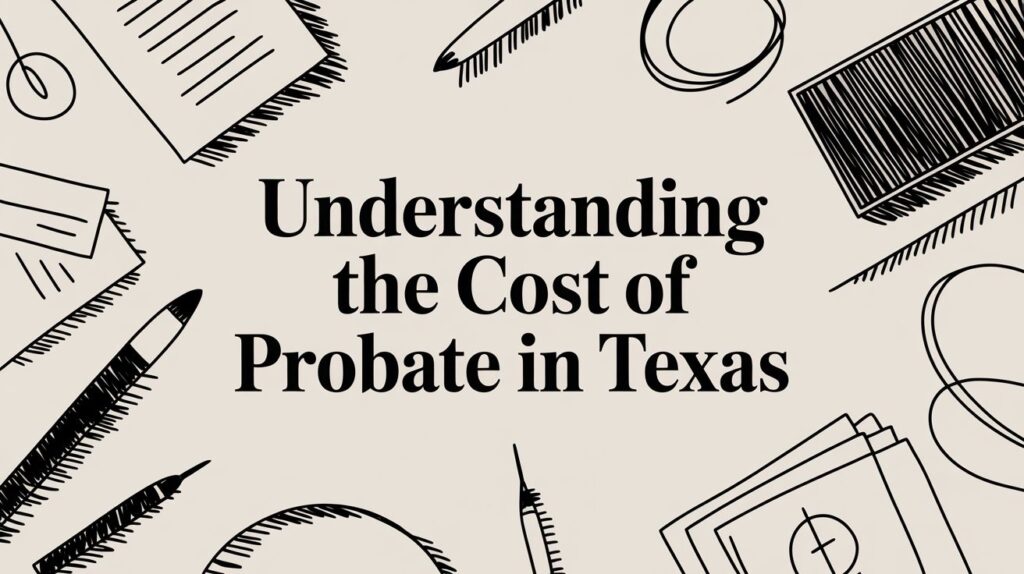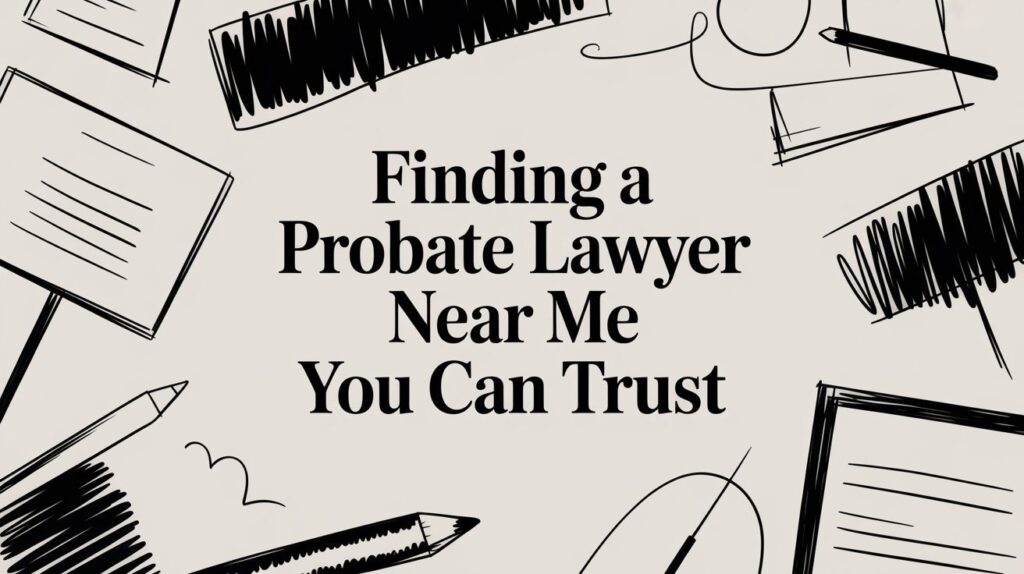When you're settling a loved one's affairs, the financial side of things can feel overwhelming, especially when you are grieving. The good news is that for a standard, uncontested probate in Texas with a valid will, families can typically expect the total court and attorney costs to land somewhere between $2,000 and $4,000.
What’s even more important to understand is that these expenses are paid directly from the estate's assets—not out of your own pocket.
What Families Can Expect to Pay for Probate in Texas
Losing someone is hard enough without the added stress of unexpected bills. Getting a clear picture of the potential probate costs in Texas right from the start can bring some much-needed peace of mind during a tough time. We're here to provide that clarity and support.
A helpful way to think about it is that the estate is like a small business being closed down. All its final expenses and bills get paid from its own bank account before the remaining assets are handed over to the new owners—the heirs. Your family's personal finances are completely separate.
Of course, the total cost isn't a single, fixed number. It’s a combination of several different expenses, and the final tally really depends on a few key things:
- The complexity of the estate: An estate with just a single bank account and a car is going to be far less expensive to probate than one with multiple properties, business interests, and a stock portfolio.
- The clarity of the will: A professionally drafted, crystal-clear will that meets the requirements of the Texas Estates Code makes the entire process smoother, faster, and much more affordable.
- Family cooperation: When everyone is on the same page and working together, it dramatically cuts down on the legal hours—and costs—needed to close the estate.
A Quick Look at Common Expenses
For the most straightforward cases in Texas—the ones with a clear will and cooperative heirs—the primary costs are attorney fees and court filing fees. For instance, a simple process like a muniment of title might run between $1,500 and $2,000, which includes the court filing fee of around $500.
It’s crucial to remember these fees are paid directly from the estate. If the estate doesn’t have enough cash on hand, the executor may need to sell an asset, like a car or some stocks, to cover the costs. You can learn more about how attorneys get paid in our guide on how Texas probate attorneys charge.
When a major asset like a house is involved, navigating a probate sale can introduce other potential costs, such as appraisal fees and realtor commissions. Every estate is unique, but knowing this basic cost structure gives you a solid foundation for what to expect.
Estimated Probate Costs in Texas for a Standard Estate
Here's a summary of common expenses you can expect during a typical, uncontested probate process in Texas. Remember, these are just estimates and can vary by county and the specifics of your case.
| Expense Category | Typical Cost Range | Notes |
|---|---|---|
| Court Filing Fees | $400 – $600 | Varies by county. This is the initial fee to open the probate case. |
| Attorney Fees | $1,500 – $5,000+ | Flat fees are common for simple cases. Hourly rates apply for more complex or contested estates, which can significantly increase costs. |
| Executor Fees | 0% – 5% of estate value | Often waived if the executor is a family member. By law, it can be up to 5% of the estate's gross value. |
| Appraisal Fees | $300 – $700 per asset | Required for assets like real estate, collectibles, or business interests to determine their fair market value. |
| Notice to Creditors | $100 – $300 | The cost to publish a notice in a local newspaper, which is a required step to notify potential creditors. |
| Miscellaneous | $100 – $500 | Includes costs for certified copies of court documents (Letters Testamentary), postage, and other administrative expenses. |
These figures should give you a general idea for budgeting purposes. While every situation is different, having a roadmap of potential costs can make the process feel much more manageable.
Breaking Down the Core Expenses of Texas Probate
Trying to understand the total cost of probate can feel overwhelming, but it’s much simpler when you look at it piece by piece. Think of it like budgeting for a home renovation—you don't just have one giant cost. You have separate line items for materials, labor, and permits. Probate is the same way, with a handful of distinct fees that add up to the final number.
Breaking down these individual expenses is the key to getting a clear financial picture and taking the uncertainty out of the process.
This visual gives you a quick overview of the main cost categories, showing how each one contributes to the total expense of settling an estate.

As you can see, the final bill is a combination of several different costs, each with its own role in the legal journey of settling an estate. Let’s walk through them.
Court Filing Fees
The very first step in the Texas Probate Process is filing an application with the court, and that comes with a filing fee. This is the non-negotiable cost to officially open the case and get it on the court's docket.
The exact amount varies from one county to another, but it's typically somewhere between $400 and $600.
Attorney Fees
For most families, this will be the biggest line item on the probate budget. In Texas, probate attorneys usually charge in one of two ways, and it’s critical to know which one your lawyer uses.
- Flat Fee: This is a single, all-inclusive price for handling a straightforward, uncontested probate. The big advantage here is cost certainty—you know exactly what you’re paying from day one.
- Hourly Rate: When an estate is more complex, involves family disputes, or requires significant legal legwork, an attorney will bill for their time. This is common when things get messy.
Knowing your attorney’s fee structure upfront is the best way to manage expectations and budget accordingly. If you want to dig deeper, you can explore the different factors that determine will probate cost in Texas.
Executor Compensation
The person tasked with managing the estate—the executor—is legally entitled to be paid for their work. It's a demanding job that involves significant responsibility.
The Texas Estates Code, Title 2, allows for a commission of up to 5% of all the money the estate pays out and takes in. This is meant to compensate them for their time, effort, and responsibility.
Here's a key point: Many executors, especially if they are close family members, choose to waive this fee. They do it to maximize the inheritance left for the beneficiaries. However, the option for payment is always there to recognize the significant work involved.
Appraisal and Other Professional Fees
If the estate holds assets beyond simple cash—like a house, a family business, or valuable artwork—you'll likely need to hire professionals. An appraiser, for instance, is often required to determine the fair market value of these assets.
This isn't just a formality. Accurate valuations are crucial for tax purposes and ensuring every heir gets their fair share. You might also need to pay for an accountant to handle the final tax returns or a land surveyor for real estate.
Each of these costs adds up. While court fees are fairly predictable, attorney fees for even simple, uncontested cases can range from $2,000 to $4,000. By understanding what goes into the final bill, you can get a much better handle on the financial road ahead.
Why Some Estates Cost Significantly More to Probate
While the average probate process is pretty straightforward, certain factors can stretch the timeline and cause the probate costs in Texas to skyrocket. Understanding these potential minefields is the first step toward avoiding them and ensuring a smoother journey for your family.
The truth is, not all estates are created equal. The final bill is heavily influenced by the complexity of the assets, the clarity of the estate plan, and—most importantly—the dynamics between family members.
The Impact of Family Conflict
By far, the single biggest reason probate costs inflate is disagreement among the heirs. When beneficiaries can't see eye to eye, the probate court can turn into a battleground. Legally, this is known as Probate Litigation.
Imagine a parent passes away, leaving the family home to three adult children. Two kids want to sell the house and split the cash, but the third, who lives there, refuses to leave. This stalemate forces the whole mess into court.
What should have been a simple asset transfer now involves:
- Additional attorney hours for hearings, motions, and tense negotiations.
- Mediation sessions to try and broker a deal outside of the courtroom.
- Potentially a forced sale ordered by a judge who has had enough.
Each one of these steps adds thousands of dollars in legal fees, all paid from the estate's assets. That means less inheritance for everyone involved, simply because of a dispute that couldn't be settled privately.
Dying Without a Will or With Complex Assets
Another major cost driver is the absence of a valid Will. When someone dies intestate (a term meaning "without a will"), Texas law decides who gets what. This process, governed by the Texas Estates Code, Title 2, Subtitle E, often requires more court intervention—like appointing an attorney to track down unknown heirs, which adds to the expense. For more on this, you can learn about taxes and probate in Texas in our detailed guide.
On top of that, complex assets can complicate everything. An estate that includes a family business, property in another state, or a large investment portfolio needs specialized valuations and legal work. This naturally increases both the time and the cost involved.
Contested or ‘adversarial’ probate, which happens in an estimated 10–15% of cases, can inflate legal bills to $15,000 or more. In these scenarios, costs for appraisals, tax preparation, and executor compensation also grow, and the process can take two to three years to settle.
The most effective way to prevent these expensive headaches is through proactive planning with clear Wills & Trusts.
A Tale of Two Texas Estates: A Realistic Scenario

Sometimes the best way to grasp the real-world impact of probate costs in Texas is to step away from the legal jargon and watch how it plays out for actual families. Legal terms and dollar signs become much more tangible when you see how they affect people's lives.
Let's compare two fictional—but entirely realistic—family stories to see just how dramatically the outcome can shift based on two key factors: planning and cooperation.
The Miller Family: A Smooth and Swift Process
First, let’s meet the Millers. Their mother passed away, leaving behind a clear, professionally drafted Will. Her estate was simple and organized: a paid-off house in a quiet neighborhood, a reliable car, and a couple of bank accounts.
Because the Will was so well-written and all three children were on the same page, the process moved like clockwork. The executor, their oldest brother, hired an attorney for a reasonable flat fee. He gathered all the necessary documents in a week, and the probate case proceeded without a single dispute.
The result for the Millers:
- Total Time: The entire estate was settled and distributed in about nine months.
- Total Cost: The total probate costs, including the attorney's flat fee and court filings, came to roughly $3,500.
- The Outcome: The process was emotionally manageable, preserving family bonds and maximizing the inheritance they received.
The Garcia Family: A Costly and Contentious Journey
Now, consider the Garcia family. Their father died unexpectedly, and he never got around to making a Will. His estate was more complex, including the family home, a few investments, and the small auto repair shop he'd owned for decades.
With no Will, the court had to step in just to determine who the legal heirs were under Texas law. That immediately added time and expense. But things got worse. A bitter dispute erupted between two of the siblings over what to do with the auto shop—one wanted to sell it, while the other wanted to take it over.
That single disagreement spiraled into a prolonged legal battle. They had to hire an expensive business appraiser, and their attorneys started billing by the hour for every tense negotiation, court hearing, and angry phone call.
The result for the Garcias:
- Total Time: The estate was stuck in the court system for over two years before it was finally closed.
- Total Cost: Legal fees, court costs, and appraisal fees skyrocketed to more than $10,000.
- The Outcome: The staggering costs ate away at the inheritance, and the conflict left lasting scars on their family relationships.
This side-by-side comparison shows that thoughtful estate planning through Wills & Trusts and maintaining family harmony are not just about emotional well-being. They have a direct and powerful impact on the financial legacy you leave behind. When disagreements turn into legal battles, it often leads to Probate Litigation, which is the single most significant factor in escalating probate costs.
How to Manage and Reduce Probate Costs

While some probate expenses like court filing fees are set in stone, families have far more control over the final bill than they often think. By taking a few proactive and organized steps, you can significantly trim the costs, making sure more of your loved one's legacy goes to the intended heirs.
It all boils down to efficiency and clear communication. The more organized you are and the less room there is for arguments, the faster—and cheaper—the entire process will be.
Foster Open Communication Among Heirs
Honestly, the single most effective way to keep probate costs from spiraling out of control is to prevent family fights. When beneficiaries start disagreeing over who gets what or how the executor is handling things, it can quickly escalate into expensive Probate Litigation.
What was once a straightforward administrative task can become a full-blown legal battle, with attorney fees piling up on all sides. Encourage regular, transparent conversations among everyone involved. When people feel heard and kept in the loop, suspicion and misunderstandings don't have a chance to fester.
Prepare and Organize Key Documents
Before you even step into a probate attorney's office, you can save a ton of time and money by getting your paperwork in order. If an attorney is billing by the hour, you don't want them spending that valuable time chasing down documents you could have found yourself.
Get a folder and start gathering these essential items:
- The original, signed Will.
- Death certificates.
- Recent statements for bank and investment accounts.
- Deeds for any real estate properties.
- Titles for cars, boats, or other vehicles.
- Life insurance policies.
- Information on any outstanding debts, like mortgages or credit cards.
Explore Proactive Estate Planning Tools
Without a doubt, the most powerful way to slash probate costs in Texas is to plan ahead. Certain legal instruments can allow assets to bypass the probate process entirely, transferring them directly to heirs without any court involvement.
Creating comprehensive Wills & Trusts is the cornerstone of any smart estate plan. A living trust, for instance, lets you place assets under the control of a trustee, which completely removes them from the probate estate.
Other tools like Transfer-on-Death Deeds (TODDs) for real estate or Payable-on-Death (POD) designations for bank accounts are simple but incredibly effective ways to streamline inheritance. For those looking at more advanced strategies to protect assets, a Family Limited Liability Company for estate planning can be another powerful tool in the toolbox.
Key Insight: The Takeaway on Managing Costs
Being organized and fostering open communication are not just about making things easier; they directly impact your bottom line. Every hour you save your legal team by having documents ready is an hour of billable time you don't have to pay for. More importantly, preventing family disputes through clarity and cooperation is the single best way to avoid the staggering costs of litigation, preserving both the estate's value and family relationships. Proactive planning is the most powerful tool for a cost-effective probate process.
Wrapping It Up: What Really Matters with Probate Costs
When you're dealing with a loved one's estate, the financial side of things can feel overwhelming. But here’s the good news: while probate costs in Texas are a real part of the process, they aren’t a mystery. They follow a predictable path, and with the right perspective and guidance, they're entirely manageable.
As you move forward, keep these core truths in mind:
- The Estate Pays, Not You: This is a huge point of relief for most families. You are not personally on the hook for probate expenses. Every cost, from the initial court filing to the final attorney payment, is covered by the estate's assets before a single dollar is inherited.
- A Good Plan Is Your Best Money-Saver: The single biggest driver of high probate costs? Ambiguity and family fights. A clear, legally sound Will and honest conversations with family are the most effective tools you have to keep expenses down. They prevent the kind of expensive legal battles that come from confusion or disagreement.
- Talk About Fees Upfront: Have a frank conversation with your attorney about their fee structure right from the start. Understanding whether you'll be paying a flat fee or an hourly rate is critical for budgeting and makes sure there are no unwelcome surprises down the road.
The most thoughtful and financially savvy gift you can leave your family is a well-crafted estate plan. Taking the time now to create clear Wills & Trusts is the number one way to ease the burden on your loved ones later, making an already tough time much more bearable.
Remember, you don't have to walk through this complicated financial maze alone. The right guide can make all the difference.
Frequently Asked Questions About Texas Probate Costs
As families begin to sort through the financial side of probate, a lot of specific questions tend to pop up. Here are some clear, plain-English answers to the concerns we hear most often.
Can I Pay for Probate Myself if the Estate Has No Cash?
Yes, and this is a situation many families face. It’s common for an heir or the named executor to pay for initial costs like court filing fees or an attorney’s retainer out of their own pocket. If you do this, it is absolutely critical to keep meticulous records of every single payment.
Once the estate’s assets—like a house, car, or other property—are sold, you can be legally reimbursed from those funds before any inheritance gets distributed to the heirs. Just be sure to discuss this plan with your attorney beforehand to ensure the reimbursement process follows Texas law to the letter.
How Long After Costs Are Paid Do I Get My Inheritance?
This is the final stretch of the journey. Once all the estate’s bills are settled—that means court costs, attorney fees, any claims from creditors, and final taxes—the executor can finally move forward with distributing the assets. This is the last major step in the Texas Probate Process.
For a straightforward, uncontested estate where everything runs smoothly, this final distribution usually happens within a few weeks of paying all the expenses. The executor will prepare a final accounting for the beneficiaries to look over before they hand out the remaining assets as directed by the Will or state law. The timeline for getting your inheritance is tied directly to settling all the estate's financial obligations.
Is It Possible to Completely Avoid Probate in Texas?
It absolutely is. With some proactive Wills & Trusts planning, it's possible to structure an estate so that many, if not all, of your assets bypass the probate courts entirely. This is also a key component in planning for matters like Guardianship.
Here are some of the most effective tools for doing that:
- Living Trusts: Any assets you place into a trust are not considered part of your probate estate.
- Beneficiary Designations: Simply naming beneficiaries on things like life insurance policies and retirement accounts keeps them out of probate.
- Payable-on-Death (POD) Accounts: You can designate someone to inherit a bank account directly, no court required.
- Transfer-on-Death Deeds (TODDs): These allow real estate to pass straight to a new owner without getting tangled up in the court system.
Using these strategies lets your assets transfer directly and privately to the people you choose, saving a significant amount of time and cutting down the overall probate costs in Texas.
If you’re facing probate in Texas, our team can help guide you through every step — from filing to final distribution. Schedule your free consultation today.







